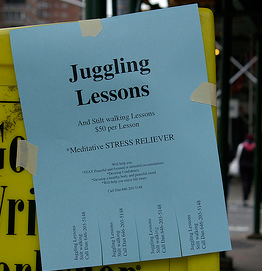Cognitive Behavioral Therapy and Anxiety: Juggling For Fish 101
On a scale of 1-10 how annoying is it when therapists ask questions which sound more like triage than psychotherapy?
One of my commenters took me to task for not talking much (or indeed at all) about the behavioral side of cognitive behavioral therapy (CBT) in a recent post. I shall now regale you with exciting tales of behavioral psychology in order to rectify the situation. Or not, since I expect your definition of exciting extends a touch beyond this topic.
My somewhat love-hate relationship with the B part of CBT aside, the real question is what works.
Mental Health: Good Therapy Versus Good Technique
 The best therapists I know sideline much of their therapeutic baggage as per training/clinical experience and look at what's going on with and for the client. They are able to "meet them where they're at." They didn't go at me with the same tool they used on the last guy and hope that it'd work because I'd eventually fit their mold of a good, treatable anxiety disordered client.
The best therapists I know sideline much of their therapeutic baggage as per training/clinical experience and look at what's going on with and for the client. They are able to "meet them where they're at." They didn't go at me with the same tool they used on the last guy and hope that it'd work because I'd eventually fit their mold of a good, treatable anxiety disordered client.
Holistic treatment is great, but what happens if someone needs a cognitive booster shot, not an existential crisis? Equally, behavioral interventions have their place in mental health treatment - particularly for phobias. Behavioral interventions can also really frustrate people.
I have axes to spare on all sides, but what gets me now is this issue of having a fairly rigidly adhered to style and a belief that it'll work for most people most of the time. It gets in the way of helping, especially in the long-term but is nevertheless common.
In strict CBT I remember sitting around feeling patronized as I was told my experience of the world was statistically improbable after which I was handed a sheet to tick options that theoretically neatly categorized my anxiety so we could work on it.
And by 'we' this therapist meant I'd listen and do precisely as she intended or endure the same argument about lies, (im)probability and statistics. It was at this point I began imagining myself as a dolphin balancing a ball at the end of my nose to earn a fish.
Did I Get Useful Things Out of CBT For Anxiety?

Yes. I learned one cannot sanitize a mind by the power of stubbornness alone.
Seriously, I got to link what I knew about meditation and mindfulness with CBT concepts, and help my panic with some exposure therapy. But I had no expectation CBT would fix all my issues, or even the majority of them.
I was lucky. It wasn't my first, let alone my only experience with psychotherapy; I hadn't walked in hoping beyond hope that this person right in front of me would find a way to stop the gaping wounds from bleeding.
Talking to folks who've experienced mainly short-term CBT with a psychiatrist on the side I've heard a lot of dissatisfaction. Not because the techniques are ineffective but because a focus on technique left the client feeling boxed-in, an outsider to the therapeutic process. Or because they were hoping beyond hope.
My main beef in all this is with therapists who seem to go to school only to learn that technique is a crutch and clients need that same thing. No. Just no.
But so long, and thanks for all the fish.
APA Reference
White, K.
(2011, June 19). Cognitive Behavioral Therapy and Anxiety: Juggling For Fish 101, HealthyPlace. Retrieved
on 2025, December 26 from https://www.healthyplace.com/blogs/treatinganxiety/2011/06/how-cbt-taught-me-to-balance-a-ball-on-my-nose
Author: Kate White
Pardon me for correcting Dr. Ferati, but your grammar needs some polishing.
I've noticed that the comments are at times old. Or, doesn't that really matter? Seems to me they should be more current. Do you have anything on Electroconvulsive Therapy?
Psychotherapy as profession try to find an optimal professional and emotional engagement as well. But, the vast majority of psychotherapist, especially they that offer Cognitive Behaviour Therapy (CBT), didn't regard this fact with respect. In their daily practice, they have focused in stereotypical manner their attention on psychological ciphers and parameters, than to respective client who needs professional helping. Every psychiatric patient presents a specific occasion that deserved an active and individually approaching. Otherwise, the patients would to feel themselves as "experimental rat", in which situation is damaged the therapeutic process. This style of accomplishment of psychotherapy mostly satisfy the neurotic needs of psychotherapist, that in a word means abused intervention and procedure, in any case. Therefore, it would have a lot of dissatisfied patients, like You Ms. White, that will wander from one therapist to another.
This is an unfortunate side-effect of "evidence-based" therapy. The technique is tested with randomised controlled trials and if it proves statistically to be sufficiently beneficial it is dispensed in standard doses like medication.
There are many skilled and compassionate therapists who would love to work within the NHS etc, but their modality does not lend itself to RCT testing and therefore they never get the chance to work with the majority of clients who cannot afford to pay fees.
Before choosing a therapist, you need to fully investigate their qualifications & experience. In the UK the term Cognitive Behaviour Therapist is not a protected title, and there are many people whom claim to practice cbt when in fact they do not. A good place to start is (UK) the BABCP (AUS) AABCT or (US) ABCT whom will be able to point you towards therapists with a minimum standard of training in the cognitive and behavioural psychotherapies.
Kate:
Again great blog. This should be mandatory reading for therapists. We often can forget what it's like to sit in the other chair, and this blog takes you there.
Zach